 MyDogBreeds
MyDogBreeds Toy Mi-Ki is originated from United States but Harrier is originated from United Kingdom. Toy Mi-Ki may grow 20 cm / 7 inches shorter than Harrier. Toy Mi-Ki may weigh 22 kg / 48 pounds lesser than Harrier. Both Toy Mi-Ki and Harrier has almost same life span. Both Toy Mi-Ki and Harrier has same litter size. Both Toy Mi-Ki and Harrier requires Moderate maintenance.
Toy Mi-Ki is originated from United States but Harrier is originated from United Kingdom. Toy Mi-Ki may grow 20 cm / 7 inches shorter than Harrier. Toy Mi-Ki may weigh 22 kg / 48 pounds lesser than Harrier. Both Toy Mi-Ki and Harrier has almost same life span. Both Toy Mi-Ki and Harrier has same litter size. Both Toy Mi-Ki and Harrier requires Moderate maintenance.
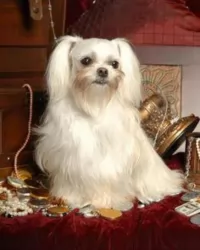 The Toy Mi-Ki is a sociable companion dog. He hasn’t got a long history, and the little bit of history there is, isn’t clear.
The Toy Mi-Ki is a sociable companion dog. He hasn’t got a long history, and the little bit of history there is, isn’t clear.
It is believed that the breed was bought about by Maureen Westburg. It was in the 1980s that she crossed several toy breeds to develop the Mi-Ki. It is thought that she gave the dog the name Mi-Ki because her name was Mikkie. It seems whe wanted a dog that came close to looking like a gremlin.
Some of the dogs used in the breeding program were the Japanese Chin, the Maltese, and the Papillon. The International Miki Registry is trying to get recognition with the United Kennel Club for this dog. There are other canine clubs and organizations that recognize the Mi-Ki Dog as a breed.
 Developed in Great Britain, the Harrier is another hunting dog – a hound that primarily hunts hares and small prey. The breed itself is medium sized - smaller than an English Foxhound and larger than a Beagle. Although the definitive origins of the Harrier are not set, it is believed that he is a cross of the Basset Hound, Talbot Hound and Bloodhound. Others believe the breed is a cross of the Greyhound and the English Foxhound. The Harrier looks like a smaller version of the English Foxhound.
Developed in Great Britain, the Harrier is another hunting dog – a hound that primarily hunts hares and small prey. The breed itself is medium sized - smaller than an English Foxhound and larger than a Beagle. Although the definitive origins of the Harrier are not set, it is believed that he is a cross of the Basset Hound, Talbot Hound and Bloodhound. Others believe the breed is a cross of the Greyhound and the English Foxhound. The Harrier looks like a smaller version of the English Foxhound.
The Harrier is a pack dog and in 1260, Sir Elias de Midhope established the first pack in England. From there the breed spread to Wales and Western England, most used in Ireland where they hunt fox as well as hares. However, hunting hares is the specialty of the breed and even gave the breed its name. In 1885 they were recognized by the American Kennel Club in the Hound Group. Yet despite this and despite the number of Harriers working in England, they are not recognized by the UKC.
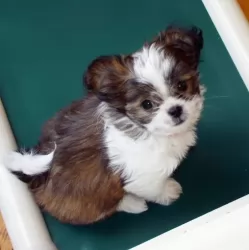 The small Toy Miki stands at between 25 cm – 30 cm in height and weighs between 2 – 5kg. You get two different coat types – long and short and the long-haired variety also has quite a bit of hair around the face.
The small Toy Miki stands at between 25 cm – 30 cm in height and weighs between 2 – 5kg. You get two different coat types – long and short and the long-haired variety also has quite a bit of hair around the face.
His longish coat is low-shedding which makes him popular for people who battle with allergies. The Miki Dog will produce about 2 – 4 puppies.
As a toy dog, he has a domed head with large eyes. Their ears are feathered and are carried erect and the tail is long and feathered.
These little dogs are popular companion dogs and they’re intelligent and loving, making the ideal pet for anyone.
It’s a friendly dog and yet he will bark to alert you of an intruder. Youll take notice because he isn’t the kind of dog that just yaps away.
Children love them and they make great playmates for children who have been taught to be kind and gentle with animals.
Their small size and their adaptable nature make them suitable for city or country living. Sweet and amicable, the social purebred Toy Mi-Ki is everything you want in a companion.
He is loyal and devoted, calm and adaptable. They’re not the kind of dogs to go jogging with you, but nonetheless, he will still need his exercise – walks every day as well as ball games.
 The Harrier is a typical hound dog much like the English Foxhound. The breed is a little smaller than the Foxhound but is muscular and large boned like his cousin. They have short hard hair that sheds and ears that hang. The Harrier is a large boned breed built for strength and stamina in the race with hares. They have broad skulls, strong muzzles, with hazel or brown eyes. They also have a black, wide nose and a high, medium length tail.
The Harrier is a typical hound dog much like the English Foxhound. The breed is a little smaller than the Foxhound but is muscular and large boned like his cousin. They have short hard hair that sheds and ears that hang. The Harrier is a large boned breed built for strength and stamina in the race with hares. They have broad skulls, strong muzzles, with hazel or brown eyes. They also have a black, wide nose and a high, medium length tail.
They say he has a ‘courtly grin’ on an expressive face. Being pack dogs, they must be sturdy, able to cover any type of terrain, for as long as the hare runs. It is critical that their scenting and running tools are exceptional. He is blue or yellow-pied. His feet are cat like and the chest is dropped low. He is an extremely well-proportioned dog
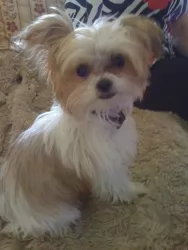 The Mi-Ki is calm and good-natured, and because of his cuteness, he can’t help but become a lap dog, if you allow him.
The Mi-Ki is calm and good-natured, and because of his cuteness, he can’t help but become a lap dog, if you allow him.
He is social and just loves human companionship. He is friendly too and will quite happily be friends with children and pets in the home.
Make sure he is trained and socialized so that you become one of the many people who have nothing but good things to say about this sweet little dog.
 Yes, they are good with children but are very rambunctious and should be supervised with young children.
Yes, they are good with children but are very rambunctious and should be supervised with young children.
Scenting ability and wonderful personality
This breed is very adaptable as long as it gets enough exercise. He can live in the country or she can live in the city with an outlet for exercise.
Smart but stubborn at times. Therefore, his learning ability is moderate.
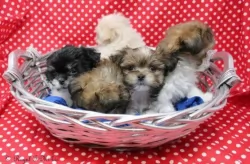 You just have to bear in mind, that because of his short muzzle, he is prone to respiratory problems. Too much exercise and you may find him huffing and puffing. Be careful on a hot day.
You just have to bear in mind, that because of his short muzzle, he is prone to respiratory problems. Too much exercise and you may find him huffing and puffing. Be careful on a hot day.
Also, little dogs like this often have all kinds of dental problems. When you brush him, check his teeth because he can’t tell you if he has a rotten tooth causing him a lot of pain and misery.
Check his eyes too that they are bright and clear and check the inside of his ears. Hypothyroidism and eye issues can also bother the Mi-ki.
 It seems the only real health issue other than hunting accidents or foot and toe incidents due to hunting.is:
It seems the only real health issue other than hunting accidents or foot and toe incidents due to hunting.is:
This abnormality in the hip socket can cause arthritis and lameness that is very painful. This is the most severe form. The Harrier can have a milder form that does not progress to this level. Hip dysplasia has a genetic component, but the environment plays a role as well and active hunting dogs are especially prone to this.
Floppy ears that hang down are always susceptible to ear infections. Check them often and clean them at least weekly.
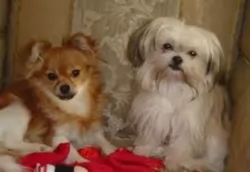 Considered to be low-shedding, the Mi-Ki will benefit from a brush once or twice a week.
Considered to be low-shedding, the Mi-Ki will benefit from a brush once or twice a week.
Some people take their Mi-Ki’s to have their hair professionally cut. This is a good move because then the ears, teeth, and nails are attended to as well.
You can do all of these things at home yourself, but sometimes, particularly with the long-haired Miki, the matting of the hair can make it that you rather send him to professional groomers.
Like all dogs, the Mi-Ki dog will need nutritious food if he is to stay healthy. He isn’t a big eater and you will find the perfect food for your small canine pet.
Read on the packaging to make sure you get high-quality dry food for small dogs. You want the ingredients to be as natural as possible without any toxic colorants and additives.
Meat and protein must always be the top ingredients. Try to provide some home-made food too. Boiled chicken, brown rice, spinach, and sweet potatoes can be chopped up finely and a small portion added occasionally to the dry kibble as a tasty treat.
 Feed a high nutrition puppy food dry food made for an energetic breed. Feed 3 times a day ½-3/4 cup each time.
Feed a high nutrition puppy food dry food made for an energetic breed. Feed 3 times a day ½-3/4 cup each time.
Again feed a high nutrition adult food for an active breed. Feed twice a day 1-11/2 cups each time.
Outstanding health unless in a hunting accident.
The Harrier is an energetic, hunting breed that needs a lot of exercise on a daily basis. Long walks and jogging or running is good for the Harrier. If they are not working, hunting dogs they need more exercise. A fenced yard for playing is good. If this intense breed does not get enough exercise and mental stimulation, he needs there could be issues with destructive behavior and obesity. Flyball, tracking, agility, coursing, rally and hunting are great activities for this breed of dog. In addition, they are pack animals and do better in a family that has more than one dog.